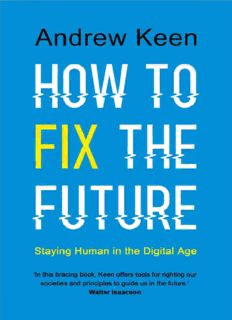
How to Fix the Future: Staying Human in the Digital Age PDF
Preview How to Fix the Future: Staying Human in the Digital Age
ALSO BY ANDREW KEEN The Cult of the Amateur: How Today’s Internet Is Killing Our Culture Digital Vertigo: How Today’s Online Social Revolution Is Dividing, Diminishing, and Disorienting Us The Internet Is Not the Answer First published in hardback in the United States of America in 2018 by Atlantic Monthly Press, an imprint of Grove Atlantic, Inc. First published in hardback in Great Britain in 2018 by Atlantic Books, an imprint of Atlantic Books Ltd. Copyright © Andrew Keen, 2018 The moral right of Andrew Keen to be identified as the author of this work has been asserted by him in accordance with the Copyright, Designs and Patents Act of 1988. All rights reserved. No part of this publication may be reproduced, stored in a retrieval system, or transmitted in any form or by any means, electronic, mechanical, photocopying, recording, or otherwise, without the prior permission of both the copyright owner and the above publisher of this book. 1 2 3 4 5 6 7 8 9 A CIP catalogue record for this book is available from the British Library. Hardback ISBN: 978-1-78649-164-0 Trade Paperback ISBN: 978-1-78649-166-4 Paperback ISBN: 978-1-78649-168-8 E-book ISBN: 978-1-78649-167-1 Printed in Great Britain Atlantic Books An imprint of Atlantic Books Ltd Ormond House 26–27 Boswell Street London WC1N 3JZ www.atlantic-books.co.uk For our kids CONTENTS Preface: An Internet of People Introduction: We’ve Been Here Before 1 More’s Law 2 Five Tools for Fixing the Future 3 What Is Broken 4 Utopia: A Case Study (Book One) 5 Utopia: A Case Study (Book Two) 6 Regulation 7 Competitive Innovation 8 Social Responsibility 9 Worker and Consumer Choice 10 Education Conclusion: Our Kids Acknowledgments Notes Index “The Senate also has a standing rule never to debate a matter on the same day that it is first introduced but to put it off till the next morning. This they do so that a man will not blurt out the first thought that occurs to him, and then devote all his energies to defending his own proposals, instead of considering the common interest. They know that some men have such a perverse and preposterous sense of shame that they would rather jeopardize the general welfare than their own reputation by admitting they were short-sighted in the first place. They should have had enough foresight at the beginning to speak with consideration rather than haste.” —Thomas More, Utopia1 PREFACE AN INTERNET OF PEOPLE Having spent the last decade writing critically about the digital revolution, I’ve been called everything from a Luddite and a curmudgeon to the “Antichrist of Silicon Valley.” At first I was part of a small group of dissenting authors who challenged the conventional wisdom about the internet’s beneficial impact on society. But over the last few years, as the zeitgeist has zigged from optimism to pessimism about our technological future, more and more pundits have joined our ranks. Now everyone, it seems, is penning polemics against surveillance capitalism, big data monopolists, the ignorance of the online crowd, juvenile Silicon Valley billionaires, fake news, antisocial social networks, mass technological unemployment, digital addiction, and the existential risk of smart algorithms. The world has caught up with my arguments. Nobody calls me the Antichrist anymore. Timing—as I know all too well from my day job as a serial entrepreneur of mostly ill-timed start-ups—is everything. Having written three books exposing the dark side of the digital revolution, I think the time is now right for something more positive. So, rather than yet another noxious screed against contemporary technology, this book offers what I hope are constructive answers to the myriad questions on the digital horizon. To borrow a fashionable Silicon Valley word, this represents a pivot in my writing career. What you are about to read is a solutions book. It’s obvious that the future needs to be fixed. The question now is how to fix it. This is also a people book. What I’ve tried to write is a human narrative. It’s the story of how people all over the world—from Estonia and Singapore to India, Western Europe, the United States, and beyond—are trying to solve the great challenges of our digital age. “Out of the crooked timber of humanity,” the eighteenth-century German philosopher Immanuel Kant suggested, “no straight
Description: